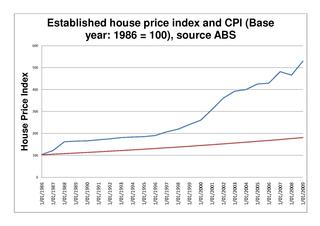Related Research Articles
Environmental finance is a field within finance that employs market-based environmental policy instruments to improve the ecological impact of investment strategies. The primary objective of environmental finance is to regress the negative impacts of climate change through pricing and trading schemes. The field of environmental finance was established in response to the poor management of economic crises by government bodies globally. Environmental finance aims to reallocate a businesses resources to improve the sustainability of investments whilst also retaining profit margins.

Public housing is a form of housing tenure in which the property is usually owned by a government authority, either central or local. Although the common goal of public housing is to provide affordable housing, the details, terminology, definitions of poverty, and other criteria for allocation vary within different contexts.
Legal aid is the provision of assistance to people who are unable to afford legal representation and access to the court system. Legal aid is regarded as central in providing access to justice by ensuring equality before the law, the right to counsel and the right to a fair trial. This article describes the development of legal aid and its principles, primarily as known in Europe, the Commonwealth of Nations and in the United States.

Jennifer Louise Macklin is an Australian former politician. She was elected to federal parliament at the 1996 federal election and served as the deputy leader of the Australian Labor Party (ALP) from 2001 to 2006, under opposition leaders Simon Crean, Mark Latham and Kim Beazley. After the ALP won government at the 2007 election, she held ministerial office under Kevin Rudd and Julia Gillard, serving as Minister for Families, Community Services and Indigenous Affairs (2007–2013) and Minister for Disability Reform (2011–2013). She retired from parliament at the 2019 election.

The Australian continent was first settled when ancestors of Indigenous Australians arrived via the islands of Maritime Southeast Asia and New Guinea over 50,000 years ago.
Poverty in Australia deals with the incidence of relative poverty in Australia and its measurement. Relative income poverty is measured as a percentage of the population that earns less in comparison to the median wage of the working population.

Affordable housing is housing which is deemed affordable to those with a household income at or below the median as rated by the national government or a local government by a recognized housing affordability index. Most of the literature on affordable housing refers to mortgages and a number of forms that exist along a continuum – from emergency homeless shelters, to transitional housing, to non-market rental, to formal and informal rental, indigenous housing, and ending with affordable home ownership.

Homelessness in Australia is a social issue concerning the number of people in Australia that are considered to be homeless. There are no internationally agreed upon definitions of homelessness, making it difficult to compare levels of homelessness across countries. A majority of people experiencing homelessness long-term in Australia are found in the large cities of Sydney, Melbourne, Brisbane and Perth. It is estimated that on any given night approximately 116,000 people will be homeless and many more are living in insecure housing, "one step away from being homeless". A person who does not obtain any shelter is often described as sleeping 'rough'.

Public housing in Australia is one part of social housing and the other is community housing. Public housing is provided by departments of state governments. Australian public housing operates within the framework of the Commonwealth-State Housing Agreement, by which funding for public and community housing is provided by both federal and state governments. According to the 2006 census, Australia's public housing stock consisted of some 304,000 dwellings out of a total housing stock of more than 7.1 million dwellings, or 4.2% of all housing stock.
The Centre of Full Employment and Equity or CofFEE is an official research centre of the University of Newcastle, New South Wales, Australia, and has operated since 1998. CofFEE's membership is drawn from the disciplines of economics, politics, sociology and geography.

A job guarantee is an economic policy proposal that aims to provide a sustainable solution to inflation and unemployment. Its aim is to create full employment and price stability by having the state promise to hire unemployed workers as an employer of last resort (ELR).

The Australian property market comprises the trade of land and its permanent fixtures located within Australia. The average Australian property price grew 0.5% per year from 1890 to 1990 after inflation, however rose from 1990 to 2017 at a faster rate and may be showing signs of a contracting economic bubble. House prices in Australia receive considerable attention from the media and the Reserve Bank and some commentators have argued that there is an Australian property bubble.

The Australian property bubble is the economic theory that the Australian property market has become or is becoming significantly overpriced and due for a significant downturn. Since the early 2010s, various commentators, including one Treasury official, have claimed the Australian property market is in a significant bubble.
A carbon pricing scheme in Australia was introduced by the Gillard Labor minority government in 2011 as the Clean Energy Act 2011 which came into effect on 1 July 2012. Emissions from companies subject to the scheme dropped 7% upon its introduction. As a result of being in place for such a short time, and because the then Opposition leader Tony Abbott indicated he intended to repeal "the carbon tax", regulated organizations responded rather weakly, with very few investments in emissions reductions being made. The scheme was repealed on 17 July 2014, backdated to 1 July 2014. In its place the Abbott government set up the Emission Reduction Fund in December 2014. Emissions thereafter resumed their growth evident before the tax.

The National Disability Insurance Scheme (NDIS) is a scheme of the Australian Government that funds costs associated with disability. The scheme was legislated in 2013 and went into full operation in 2020. Its introduction followed the 15 month long 'Make It Real' campaign which involved community forums, visits to MPs, the holding of a National Disability and Carer Congress, 'Disabilitea' gatherings, and rallies involving 20 000 people. The scheme is administered by the National Disability Insurance Agency (NDIA) and overseen by the NDIS Quality and Safeguards Commission. Bill Shorten provides ministerial oversight as Minister for the National Disability Insurance Scheme.
The Australian Housing and Urban Research Institute (AHURI) is a national not-for-profit independent network organization that funds, conducts, disseminates, and tailors research on housing, homelessness, cities and urban policy. The organisation's funding is received from the Australian Government, state and territory governments, as well as contributions from partner universities. As the only organisation in Australia dedicated exclusively to housing, homelessness, cities and related urban research, AHURI is a unique venture. Through its national network of university partners, AHURI undertakes research that supports policy development at all levels of government, assists industry in improving practice and informs the broader community. In 2022, AHURI had nine research partners across Australia.

Affordable housing is housing that is deemed affordable to those with a median household income as rated by the national government or a local government by a recognized housing affordability index. A general rule is no more than 30% of gross monthly income should be spent on housing, to be considered affordable for the challenges of promoting affordable housing varies by location.
Privatisation in Australia is the process of transiting a public service or good to the private sector through a variety of mechanisms that was commenced by the Federal Government in the 1990s, receiving bipartisan support. More generally, privatisation is a set of economic policies that is part of a broader system of deregulation of government services, underpinned by the ideology of Liberalism, in order to achieve economic outcomes of growth, efficiency and productivity. Some examples of sectors that have been privatised include finance, telecommunications and infrastructure. Australia's public service has also transformed with the introduction of New Public Management (NPM) in the late twentieth century which altered public administration models to appear more "business-like" through performance evaluations that emphasise efficiency, productivity and service delivery.

Dementia and Alzheimer's disease in Australia is a major health issue. Alzheimer's disease is the most common type of dementia in Australia. Dementia is an ever-increasing challenge as the population ages and life expectancy increases. As a consequence, there is an expected increase in the number of people with dementia, posing countless challenges to carers and the health and aged care systems. In 2018, an estimated 376,000 people had dementia; this number is expected to increase to 550,000 by 2030 and triple to 900,000 by 2050. The dementia death rate is increasing, resulting in the shift from fourth to second leading cause of death from 2006 to 2015. It is expected to become the leading cause of death over the next number of years. In 2011, it was the fourth leading cause of disease burden and third leading cause of disability burden. This is expected to remain the same until at least 2020.

Joe Flood is a policy, data analyst and mathematician. He has made contributions to mathematics, housing and urban economics, urban indicators, slum studies, climate change and genetic genealogy.
References
- ↑ "Per Capita - About Us". Archived from the original on 24 August 2012. Retrieved 23 October 2012.
- ↑ "About". Per Capita. Retrieved 26 March 2023.
- 1 2 "About". Per Capita. Retrieved 26 March 2023.
- ↑ "False Economy: The economic benefits of the NDIS and the consequences of government cost-cutting". Per Capita. Retrieved 26 March 2023.
- ↑ "ABC Insiders". 12 June 2022.
- ↑ https://newsroom.unsw.edu.au/news/business-law/budget-sounded-warnings-ndis-‘blow-out’-–-also-set-aside-funds-curb-costs-and
- ↑ https://amp.smh.com.au/national/we-should-be-proud-of-the-ndis-not-fearful-of-costs-20221122-p5c0cn.html
- ↑ "Our Work". Per Capita. Retrieved 26 March 2023.
- ↑ "The Centre for New Industry – A PerCapita Initiative" . Retrieved 26 March 2023.
- ↑ "The Centre for Equitable Housing works". centreforequitablehousing.org.au. 10 January 2018. Retrieved 26 March 2023.
- ↑ "Our Team - Per Capita". 2 March 2023. Retrieved 30 May 2023.